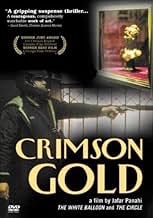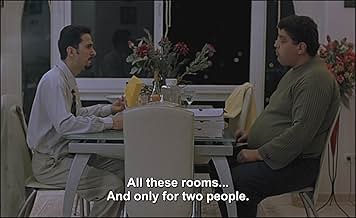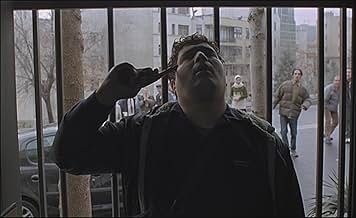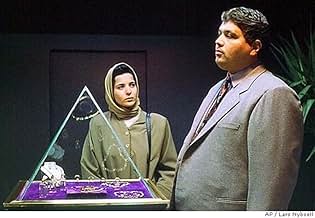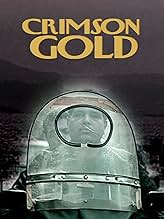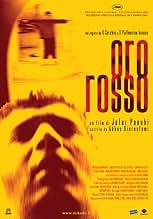IMDb RATING
7.4/10
5.6K
YOUR RATING
An Iranian pizza delivery man sees the worst of corruption and social unbalance in his city and is driven to crime.An Iranian pizza delivery man sees the worst of corruption and social unbalance in his city and is driven to crime.An Iranian pizza delivery man sees the worst of corruption and social unbalance in his city and is driven to crime.
- Awards
- 4 wins & 2 nominations total
- Director
- Writer
- All cast & crew
- Production, box office & more at IMDbPro
Featured reviews
In September of 1980, as pretty much the first military operation of the Iran-Iraq war by ground forces, Iraqi forces captured the border post at Shalamcheh. Shalamcheh was later to be the site of the largest battle of the war, Operation Karbala-5. A passing reference to Crimson Gold's main character, Hussein, having been at Shalamcheh is made in the film. So what's quite easy to miss here, for a casual Western viewer, is that protagonist Hussein Emadeddin, sometime pizza deliveryman, is a war veteran. An Iranian viewer would be expecting this anyway; it was a huge war that engulfed the generation that Hussein belongs to. Not that many Iranians will see this movie, all Panahi's films are banned in his homeland. Shalamcheh is a resonant name to Iranians, and now contains a war memorial which many travel to. Part of the battle involved "human waves" which is to say lightly armed men, in large quantities charging the well-fortified Iraqi positions, basically suicide attacks. There are stories during the war of young men, apparently volunteers, charging the minefields, in order to clear them for the more experienced soldiers.
The Iran Iraq war was a particularly unpleasant throwback: commentators have compared it to World War One due to the predomination of trench warfare. In both wars for example there was the use of mustard gas, machine gun nests, shelling, and barbed wire. I think it's pretty much implied that Hussein has been a victim of the war. He's been taking cortisone on a long term basis. Due to the copious side effects, you don't do that unless there's something severely amiss, he would have to have a severe long term illness. Prolonged use of cortisone can be prescribed to treat severe lung disorders, I would suggest that Hussein may well have been gassed (hundreds of thousands of Iranian soldiers were gassed by sulphur mustard during the war, plus mustard was used at Shalamcheh during Operation Karbala-5, on civilian populations as well as Iranian troops).
The side effects of long term cortisone use include insomnia irritability, depression, swelling, obesity, diabetes, and depressed immune response. At one point Hussein has to climb four stories to deliver a pizza when a lift is out of order and the tenant won't come down; in the light of his condition, this appears rather more tragic. The character is very easy to sympathise with because, Hussein Emadeddin is played by Hussein Emadeddin, also a pizza deliveryman with severe health problems. There's a lot of realism here.
When thinking of post-war art in film, the term noir floats to the surface. Noir developed as an art form, if not necessarily an aesthetic, as a response to the zeitgeist of the Second World War's aftermath. An anonymous individual from the University Of San Diego has put it better than I can: "The historical setting is the contemporary world that has been corrupted and lost its moral certainty. The prevailing cynicism of characters reflects the reality of the atomic bomb, Cold War, totalitarianism, propaganda, Hollywood blacklist, corrupting power of the government and press. World War II fragmented men, caused them to feel adrift, insecure, alienated, a feeling of having "gone soft" and lacking power to control their lives. The liberal movement was in crisis, due to powerful forces of communism and materialism, causing a loss of faith in progress and man's innate goodness."
Since the war there's been a crisis for the liberal cause in Iranian society, which is referenced at one point by Hussein's friend Ali, who asks what it was like in (pre-theocratical) times when women walked around naked (without veils). It's clear that there's not much fun in the Iran of this world, in one scene Hussein asks a fifteen-year-old policeman if he's ever had fun, the young chap isn't even sure what the word means, and I think that makes two of them.
Despite Hussein having been pretty much left on the scrapheap, rotting in a dingy apartment to the tune of squeaking rats, he's a nice guy, and tries his best to be kind to folk. However, after a series of humiliations, he has had enough and commits a hideous folly. It's a film about injustice that manages to be, at the same time, warm-hearted, staggeringly beautiful and polemical. You can really take Hussein Emadeddin into your heart. Which is rare in a cinematic world where men are often armour plated and hard to love.
My respects for a profoundly humane film. Quite ironically it appears that Jafar Panahi was arrested within the last week whilst giving a dinner party at his home, an absurdity that you might think would make a good scene in a Panahi movie.
The Iran Iraq war was a particularly unpleasant throwback: commentators have compared it to World War One due to the predomination of trench warfare. In both wars for example there was the use of mustard gas, machine gun nests, shelling, and barbed wire. I think it's pretty much implied that Hussein has been a victim of the war. He's been taking cortisone on a long term basis. Due to the copious side effects, you don't do that unless there's something severely amiss, he would have to have a severe long term illness. Prolonged use of cortisone can be prescribed to treat severe lung disorders, I would suggest that Hussein may well have been gassed (hundreds of thousands of Iranian soldiers were gassed by sulphur mustard during the war, plus mustard was used at Shalamcheh during Operation Karbala-5, on civilian populations as well as Iranian troops).
The side effects of long term cortisone use include insomnia irritability, depression, swelling, obesity, diabetes, and depressed immune response. At one point Hussein has to climb four stories to deliver a pizza when a lift is out of order and the tenant won't come down; in the light of his condition, this appears rather more tragic. The character is very easy to sympathise with because, Hussein Emadeddin is played by Hussein Emadeddin, also a pizza deliveryman with severe health problems. There's a lot of realism here.
When thinking of post-war art in film, the term noir floats to the surface. Noir developed as an art form, if not necessarily an aesthetic, as a response to the zeitgeist of the Second World War's aftermath. An anonymous individual from the University Of San Diego has put it better than I can: "The historical setting is the contemporary world that has been corrupted and lost its moral certainty. The prevailing cynicism of characters reflects the reality of the atomic bomb, Cold War, totalitarianism, propaganda, Hollywood blacklist, corrupting power of the government and press. World War II fragmented men, caused them to feel adrift, insecure, alienated, a feeling of having "gone soft" and lacking power to control their lives. The liberal movement was in crisis, due to powerful forces of communism and materialism, causing a loss of faith in progress and man's innate goodness."
Since the war there's been a crisis for the liberal cause in Iranian society, which is referenced at one point by Hussein's friend Ali, who asks what it was like in (pre-theocratical) times when women walked around naked (without veils). It's clear that there's not much fun in the Iran of this world, in one scene Hussein asks a fifteen-year-old policeman if he's ever had fun, the young chap isn't even sure what the word means, and I think that makes two of them.
Despite Hussein having been pretty much left on the scrapheap, rotting in a dingy apartment to the tune of squeaking rats, he's a nice guy, and tries his best to be kind to folk. However, after a series of humiliations, he has had enough and commits a hideous folly. It's a film about injustice that manages to be, at the same time, warm-hearted, staggeringly beautiful and polemical. You can really take Hussein Emadeddin into your heart. Which is rare in a cinematic world where men are often armour plated and hard to love.
My respects for a profoundly humane film. Quite ironically it appears that Jafar Panahi was arrested within the last week whilst giving a dinner party at his home, an absurdity that you might think would make a good scene in a Panahi movie.
Crimson Gold, one of the best films of the year, is absolutely stunning from start to finish. It's gritty and captures the essence of the social struggles in Iran while consistently delivering messages on the struggles we all face in life regarding love and relationships. It's a humanistic film that is extremely subtle, which turned off several viewers (as does Taxi Driver, one of my all-time favorites). Jafar Panahi's slow pacing doesn't allow the film to go into incoherent territory, but again, some viewers may be turned off by this. The pacing is really what allows the messages to set in and provoke the viewers thoughts. It's worth every second of your time, don't miss this gem.
9/10
9/10
10Ivane
"He motorbikes every evening to neighborhoods he will never live in, for a closer look at what goes on behind closed doors. But one Night, Hussain tastes the luxurious life, before his deep feelings of humiliation push him over the edge."
It's sad to see reviews - saying this is a boring movie... This movie is so good, that I totally forgot about WATCH or even Time. Hussain is one of the most interesting characters I have ever seen... and with no doubt Jafar Panahi with his 'The Circle' and 'Crimson Gold' one of the most talented directors of our time...
thx for this movie... I really enjoyed watching it on Tbilisi International Film Festival (just today)and I hope the movie gets the main prize...
It's sad to see reviews - saying this is a boring movie... This movie is so good, that I totally forgot about WATCH or even Time. Hussain is one of the most interesting characters I have ever seen... and with no doubt Jafar Panahi with his 'The Circle' and 'Crimson Gold' one of the most talented directors of our time...
thx for this movie... I really enjoyed watching it on Tbilisi International Film Festival (just today)and I hope the movie gets the main prize...
Written by the most prominent figure in Iranian social realist cinema, Talaye Sorkh is very much suggestive of some social realities in contemporary Iran. Following an underclass pizza-delivery man for a day or two of his life, Panahi's camera pictures a story that speaks only not for Hussein, but also for many of his real-life fellow citizens in Tehran. Although the film appears to be highly critical of the current social gap between the rich and the poor, Talaye Sorkh is more about alienation and marginalization. Hussein is a war veteran who is devastated by the contradictions of the values he fought for in the Iran-Iraq war and what he witnesses in the affluent neighborhoods of northern Tehran, where he delivers pizzas. He is shocked to see a former lieutenant in one of those chic houses. Thanks to Hussein Emaduddin's great performance, the film by no means begs for sympathy. It seems that the tensions of the society in which Hussein lives, has made him an emotionless man. Hussein's toneless attitude and his unusual calmness speaks of a man whose tolerance comes to a rapid explosion at the end. He is a sort of man who is unable to even feel for his fiancé. Robbing young women's purse doesn't seem to interest him either. Throughout the entire film he is in a state of shock. Although the film's plot is based on a true story, its dialog seem a bit incompetent and weak at times. The dolly shots and the overall camera-work however perfectly contributes in suggesting a schizophrenic atmosphere which has indeed been the intention of Panahi as well. Panahi's latest film is very much similar in theme with his previous award winning Dayareh. That film is also recommended for those who enjoyed this one.
Winner of the Jury Award at the 2003 Cannes Film Festival but sadly banned in Iran, Jafar Panahi's Crimson Gold shows the growing chasm in Iran between rich and poor and the psychological effects of living under a regime based on fundamentalist religion. Written by famous Iranian director Abbas Kiarostami, it is based on a newspaper account of a similar incident that took place several years ago in Tehran. The film opens inside a jewelry store where a robbery is taking place. As a crowd gathers, the robber is trapped when the security system is released and the bars close over the front door. Flashbacks then show the events that led up to the crime and the film speculates as to what might have led to this act of desperation.
Hussein (Hossain Emadeddin), an alienated heavy set man who hides his emotions, is a pizza deliveryman in Tehran who takes cortisone shots to relieve the pain of injuries sustained in the Iran-Iraq War. He is engaged to be married to his friend Ali's (Kamyar Sheissi) sister but they communicate little. Ali is a thief who snatches women's purses but is an amateur bungler who rarely scores a big take. On examining the contents of a purse with Hussein at a restaurant, they discover the receipt for an expensive necklace and their fascination leads them to visit the jewelry store where it was purchased. When the owner refuses to let them in the store because of their dress, resentment boils.
Another incident reinforces this hurt. Hussein is forced by security police to wait outside a building as they arrest people attending a party for allegedly violating the social code of the regime that prohibits men and women from dancing together. Though he good-naturedly hands out pizzas to the police and the detainees waiting outside the building, he is upset at the manner in which he is treated. A bizarre final sequence raises Hussein's anger to the breaking point. He delivers a pizza to a lavish penthouse apartment where he is invited in by the wealthy tenant (Pourang Nakaheal), a young man who recently returned to Iran after staying with his parents in the U.S. The man, who appears to be lonely, talks incessantly, complaining about the "city of lunatics" he has returned to. As the young man chats on the cell phone, Hussein wanders through the house amazed at its affluence. He finds a rooftop swimming pool and jumps in fully clothed, then sits on the roof simply gazing at the city below. Fuming inwardly, the very next day he walks into the jewelry store with a loaded gun.
Crimson Gold bravely depicts the powerlessness of the individual in an authoritarian society, yet Hussein's emotional repressiveness and the telegraphing of the final outcome dilutes the film's tension, almost to the point of lethargy. To his credit, Panahi makes a strong statement but does not wallow in polemics, making it clear that the crime results from a combination of both social and psychological factors. Hussein is not an ordinary individual beaten down by the system but a walking time bomb, a man physically and mentally damaged by the war, uncommunicative, and humiliated by each slight, no matter how minor. Like Hussein, Panahi knows something about the feeling of being trapped and humiliated and his experience lends immediacy to the film. In 2001, the director was detained, then chained to a bench for ten hours because he refused to be fingerprinted and photographed by US authorities at JFK airport, a reminder that assaults upon human dignity are not limited to a single country.
Hussein (Hossain Emadeddin), an alienated heavy set man who hides his emotions, is a pizza deliveryman in Tehran who takes cortisone shots to relieve the pain of injuries sustained in the Iran-Iraq War. He is engaged to be married to his friend Ali's (Kamyar Sheissi) sister but they communicate little. Ali is a thief who snatches women's purses but is an amateur bungler who rarely scores a big take. On examining the contents of a purse with Hussein at a restaurant, they discover the receipt for an expensive necklace and their fascination leads them to visit the jewelry store where it was purchased. When the owner refuses to let them in the store because of their dress, resentment boils.
Another incident reinforces this hurt. Hussein is forced by security police to wait outside a building as they arrest people attending a party for allegedly violating the social code of the regime that prohibits men and women from dancing together. Though he good-naturedly hands out pizzas to the police and the detainees waiting outside the building, he is upset at the manner in which he is treated. A bizarre final sequence raises Hussein's anger to the breaking point. He delivers a pizza to a lavish penthouse apartment where he is invited in by the wealthy tenant (Pourang Nakaheal), a young man who recently returned to Iran after staying with his parents in the U.S. The man, who appears to be lonely, talks incessantly, complaining about the "city of lunatics" he has returned to. As the young man chats on the cell phone, Hussein wanders through the house amazed at its affluence. He finds a rooftop swimming pool and jumps in fully clothed, then sits on the roof simply gazing at the city below. Fuming inwardly, the very next day he walks into the jewelry store with a loaded gun.
Crimson Gold bravely depicts the powerlessness of the individual in an authoritarian society, yet Hussein's emotional repressiveness and the telegraphing of the final outcome dilutes the film's tension, almost to the point of lethargy. To his credit, Panahi makes a strong statement but does not wallow in polemics, making it clear that the crime results from a combination of both social and psychological factors. Hussein is not an ordinary individual beaten down by the system but a walking time bomb, a man physically and mentally damaged by the war, uncommunicative, and humiliated by each slight, no matter how minor. Like Hussein, Panahi knows something about the feeling of being trapped and humiliated and his experience lends immediacy to the film. In 2001, the director was detained, then chained to a bench for ten hours because he refused to be fingerprinted and photographed by US authorities at JFK airport, a reminder that assaults upon human dignity are not limited to a single country.
Did you know
- TriviaThe lead actor, who plays a pizza delivery man, is actually a pizza delivery man in real life. He is also a paranoid schizophrenic, which may explain some of the character's traits and behavior.
- ConnectionsFeatured in Cinema Iran (2005)
- How long is Crimson Gold?Powered by Alexa
Details
- Release date
- Country of origin
- Official sites
- Language
- Also known as
- Crimson Gold
- Filming locations
- Tehran, Iran(location)
- Production company
- See more company credits at IMDbPro
Box office
- Gross US & Canada
- $148,959
- Opening weekend US & Canada
- $13,476
- Jan 18, 2004
- Gross worldwide
- $400,768
Contribute to this page
Suggest an edit or add missing content



